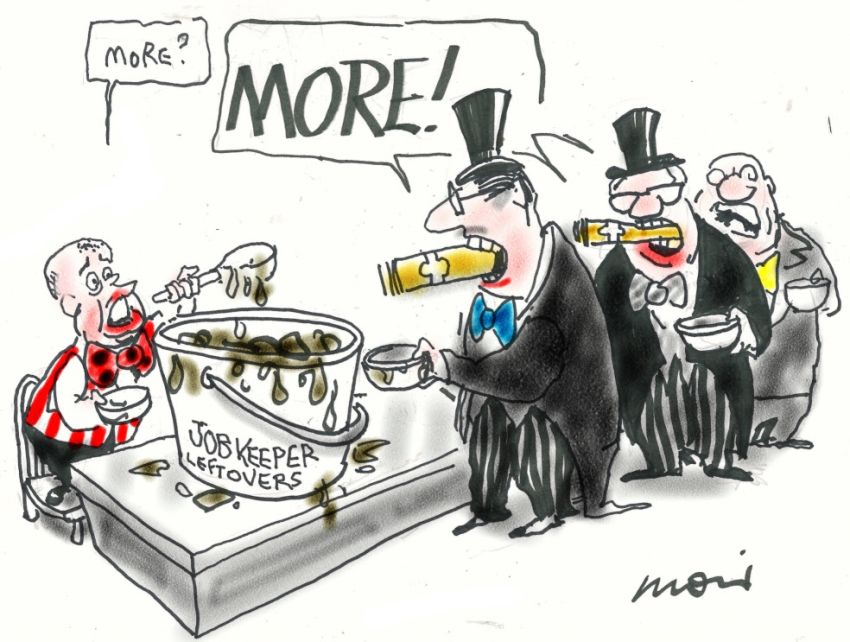
The JobMaker plan, announced by Prime Minister Scott Morrison on May 26 at the National Press Club, is an attempt to get us to accept a post-COVID-19 return to the neoliberal regime that made jobs precarious, ran down hospitals and other public services, and made housing and education unaffordable.
It is based on the familiar fairytale that, if workers help the corporate rich make more money, the benefits will trickle down in the form of good jobs and decent wages and conditions, and that this was working just fine until COVID-19 struck.
It is a lie that has already cost many people their livelihoods.
Many people who have lost their jobs in the pandemic do not have access to the temporarily boosted unemployment benefits (now called JobSeeker) and the $60 billion-undersubscribed JobKeeper wage subsidy scheme. In a few months, the government says that JobSeeker will be slashed in half and JobKeeper will end.
Morrison made it clear in his speech that these temporary measures would not be extended and people had to “get back to work”.
He also made it clear that it wasn’t a case of simply returning to the old “normal”. While his government promised to withdraw the anti-union Ensuring Integrity Bill, which was before the Senate (and had been rejected three times since 2017), it did not resile from its objectives.
Militant trade unionism is unacceptable, awards have to be simplified, enterprise bargaining (which outlaws industry-wide and broader worker solidarity action) reinforced and vocational training has to be directed by bosses, Morrison said.
This old political line — which Morrison insisted is “not ideological” but simply a package of “sensible reforms with one goal: to make jobs” — is to be discussed between now and September by five working groups convened by Industrial Relations Minister Christian Porter. These working groups will be tripartite (that is, involve government, bosses and trade unions) but might also involve “other interest groups”.
They are to discuss award simplification, enterprise bargaining, casual workers, compliance with industrial relations laws and “green fields” enterprise agreements. Morrison said his hope that all parties will “put aside differences to get Australians back into work had been boosted by his government’s “constructive” collaboration with the ACTU around COVID-19 economic measures.
The federal government’s COVID-19 economic relief package left out at least 1 million workers. While the Australian Council of Trade Unions (ACTU) protested this on paper, it has not run a real campaign to address it.
In response to Morrison’s speech, the ACTU welcomed an “opportunity to sit down with the government and employers to discuss how our economy can be rebuilt”.
ACTU secretary Sally McManus said on ABC Radio National on May 27 that she hoped to build on negotiations between herself and Porter over COVID-19 relief.
“We’ve worked together in a crisis and sometimes you do forge good working relationships,” said McManus.
“We don't agree with each other on a whole lot of issues, but he listens to us and we listen to him.”
While McManus also said that the ACTU wouldn’t agree to anything that would lead to workers being worse off, several unions have already offered to trade wage cuts for jobs.
The billionaire class is also determined to resume the path of economic growth that brought on the climate crisis, created mountains and oceans of waste and left hundreds of millions of people in desperate poverty.
Quietly, several unions have also been working with the government and big corporations to plan a socially and ecologically dangerous fossil-fuel export-led post COVID-19 recovery.
The turn to “class snuggle” politics amid the COVID-19 crisis risks a further weakening of the collective power of the working class in this country. The capitalist class can see this, and it is telling that the Business Council of Australia (BCA) now agrees with the Morrison government’s new tack towards the union movement.
“The Prime Minister is absolutely right that businesses creating jobs are at centre of the economy,” said BCA chief executive Jennifer Westacott on May 25.
“He has today put forward a sensible and practical plan to finally break the deadlock on workplace relations reform and build on the unprecedented co-operation that has steered us during the COVID-19 pandemic.
“The Business Council will be at the table working constructively to drive the recovery by reshaping the workplace relations system so employers can create more jobs and workers can share the gains of higher wages and improved conditions.
“The significance of this opportunity cannot be understated. The Prime Minister’s way forward by setting up problem-solving working groups gives business, unions, and workers a rare chance to once and for all reform the system so that it benefits the entire community.”
Such tripartite politics was at the heart of the Prices and Incomes Accord agreements between the ACTU and the Bob Hawke Labor government in the 1980s. Under the Accord, the trade union movement sacrificed wages and conditions in return for promises of a “social wage” in the form of superannuation, some wage indexation (in the early stages) and more government “consultation”.
The Accord prepared the way for enterprise bargaining which sharply eroded workers’ industrial power, and eventually severely limited the right to strike. It also heralded in a collapse in union membership, from 50% of the workforce then to only 14% today.
In short, the Accord severely weakened the union movement and hobbled the resistance to the government introducing its neoliberal deregulation and privatisation agenda.
A return to Accord-style politics today could politically disarm and confuse workers and other sectors, in the face of an actual escalation in the class struggle by the billionaire class which, as we can all clearly see, is demanding an ever bigger share of income and wealth even amid the pandemic.
[Peter Boyle is a member of the Socialist Alliance national executive and co-author of 13 years of hard labour: The lessons of the Accord experience.]